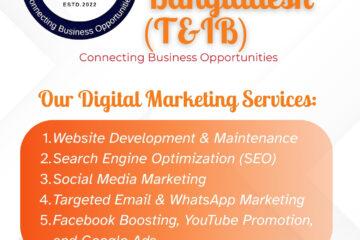Definition and Classification of Research
Md. Joynal Abdin*
Business Consultant & Digital Marketer
Co-Founder & CEO of Bangladesh Trade Center
The term RESEARCH means ‘Search for Knowledge’. Generally, research is a systematic process of searching new knowledge. It is defined by various faculties with various sentences. But the main theme is research is a systematic search for new knowledge with a specific research question and going beyond personal experience, thoughts, feelings, and opinion that does not refer to other sources of information.
Social Scientists defined research as a systematic investigative process employed to increase or revise current knowledge by discovering new facts. It is divided into two general categories:
(1) Basic research is inquiry aimed at increasing scientific knowledge, and
(2) Applied research is effort aimed at using basic research for solving problems or developing new processes, products, or techniques.
On the other hand, application of scientific method to the investigation of relationships among natural phenomenon, or to solve a medical or technical problem is known as scientific research.
From the above definitions it is prominent that, research is a systematic investigation, conducted for discovering new facts to solve a human problem.
Classification of Research:
Research could be classified into various categories based on the subject matter, research methods, source of data to be used, types of data to be used, objective of the research, purpose of the research, scope of the research etc.
- Classification based on the source of data:
Primary Research: Primary research is defined as factual, firsthand study written by a person who was part of the study. The methods vary on how researchers run an experiment or study, but it typically follows the scientific method. In other words, primary research is the original research.
Secondary Research: Secondary research is defined as an analysis and interpretation of primary research. The method of writing secondary research is to collect primary research that is relevant to a writing topic and interpret what the primary research found. For instance, secondary research often takes the form of the results from two or more primary research articles and explains what the two separate findings are telling us. In other words, secondary research is conducted to explain or refer or come up a concluding decision by explain primary research.
- Classification based on data analysis:
Qualitative Research: Qualitative Research is primarily exploratory research. It is used to gain an understanding of underlying reasons, opinions, and motivations. It provides insights into the problem or helps to develop ideas or hypotheses for potential quantitative research. Qualitative Research is also used to uncover trends in thought and opinions, and dive deeper into the problem.
Quantitative Research: Quantitative Research is used to quantify the problem by way of generating numerical data or data that can be transformed into useable statistics. It is used to quantify attitudes, opinions, behaviors, and other defined variables – and generalize results from a larger sample population. Quantitative Research uses measurable data to formulate facts and uncover patterns in research. Quantitative data collection methods are much more structured than Qualitative data collection methods.
- Classification based of purpose:
Theoretical Research: A non-empirical approach to research, this usually involves perusal of mostly published works like researching through archives of public libraries, court rooms and published academic journals. In other words, we could state that, theoretical research is research driven by curiosity or interest in a scientific question. The main motivation is to expand man’s knowledge, not to create or invent something.
Applied Research: The practical approach consists of the empirical (based on testing or experience) study of the topic under research and chiefly consists of hands-on approach. This involves firsthand research in the form of questionnaires, surveys, interviews, observations and discussion groups. In other form we could describe that, applied research is designed to solve practical problems of the modern world.
- Classification based of the objective:
Exploratory Research: Research conducted for formulating a problem for more clear investigation is known as exploratory research. The primary objective of exploratory research is to explore a problem to provide insights into and comprehension for more precise investigation. It focuses on the discovery of ideas and thoughts. The exploratory research design is suitable for studies which are flexible enough to provide an opportunity for considering all the aspects of the problem.
Descriptive Research: Research that explore and explains an individual, group or a situation, is known as descriptive or concluding research. It is concerned with describing the characteristics of a particular individual or group. It includes research related to specific predictions, features or functions of person or group, the narration of facts, etc.
- Classification based on the scope of research:
Diagnostic Study: Diagnostic research refers to studies that aim to quantify a test’s added contribution beyond test results readily available to the physician in determining the presence or absence of a particular disease.
Evaluation Study: Evaluation is the systematic acquisition and assessment of information to provide useful feedback about the outcome of a project or intervention.
- Classification based on application of research:
Action Research: Action research is either research initiated to solve an immediate problem or a reflective process of progressive problem solving led by individuals working with others in teams or as part of a “community of practice” to improve the way they address issues and solve problems. It is conducted to find solutions to problems in a specific context.
Educational Research: Educational research refers to a variety of methods, in which individuals evaluate different aspects of education including: “student learning, teaching methods, teacher training, and classroom dynamics”. It is conducted to develop and test educational theory and derive generalizations.
- Classification based on target:
Problem Oriented Research: Research conducted by the apex private sector institutions / development agencies to identify development barriers of any particular sector is known as problem oriented research.
Problem Solving Research: Research conducted by individual organization to solve a problem faced by it is known as problem solving research.
- Classification based on the researchers:
Collaborative Research: Research conducted with cross faculty / cross disciplinary issues is known as collaborative research. This type of research team generally includes more than one academic faculties / disciplines to get the study done. Biomedical physics could be an example of such research field.
Practitioner Research: Practitioner research addresses the investigator, the setting and the purpose. The investigator is the practitioner, in workplace settings ranging from hospitals, to schools and communities. The general purpose is to better align the practitioner’s purpose with their actions. There are those who argue that practitioner research stems from a larger social justice movement within qualitative research. Even when social justice is not the sole motivating principle, an underlying commonality of purpose is the desire to improve upon and develop deeper insights into one’s practice. Practitioner research by its nature offers practitioners a voice in the research conversation.
Some consider it a bridge of sorts between theory and practice, although practitioners claim a rightful place in the research continuum.
Other types of research include the followings:
- Experimental Research: Experimental research is a systematic and scientific approach to research in which the researcher manipulates one or more variables, and controls and measures any change in other variables.
- Ex Post Facto Research: Ex post facto study or after-the-fact research is a category of research design in which the investigation starts after the fact has occurred without interference from the researcher. The majority of social research, in contexts in which it is not possible or acceptable to manipulate the characteristics of human participants, is based on ex post facto research designs. It is also often applied as a substitute for true experimental research to test hypotheses about cause-and-effect relationships or in situations in which it is not practical or ethically acceptable to apply the full protocol of a true experimental design. Despite studying facts that have already occurred, ex post facto research shares with experimental research design some of its basic logic of inquiry.
- Comparative Research: Research conducted to compare two phenomena is known as comparative study. It could be a concurrent comparison or historical comparison between two phenomena.
- Historical Research: Historical research is a method of social science that examines historical events in order to create explanations that are valid beyond a particular time and place, either by direct comparison to other historical events, theory building, or reference to the present day.
- Ethnographic Research: Ethnography is a qualitative method for collecting data often used in the social and behavioral sciences. Data are collected through observations and interviews, which are then used to draw conclusions about how societies and individuals function or behave. In other words we could state that, it is the study of people in their own environment through the use of methods such as participant observation and face-to-face interviewing.
- Correlational Research: Study conducted to identify interrelation between two or more variables is known as correlational research. It is a quantitative method of research in which you have 2 or more quantitative variables from the same group of subjects, & researchers are trying to determine if there is a relationship (or covariation) between the 2 variables (a similarity between them, not a difference between their means).
- Grounded Theory Research: Grounded theory is a systematic methodology in the social sciences involving the construction of theory through the analysis of data.
- Phenomenological Research: Phenomenological research study is a study that attempts to understand people’s perceptions, perspectives and understandings of a particular situation (or phenomenon).
- Explanatory Research: Explanatory research is defined as an attempt to connect ideas to understand cause and effect, meaning researchers want to explain what is going on.
- Predictive Research: Predictive analytics / research is a form of advanced analytics that uses both new and historical data to forecast future activity, behavior and trends.
Definition and Classification of Research, this is the summary of two chapters of the book “Research Manual” of the Author. To purchase the book click here.
Features of Different Types of Research:
To select a best research technique for a given topic knowledge about the features of different types of research is important. Because of selection of the appropriate research method is known as half-done of the research. Otherwise misleading information may come up with the research result / findings. Let us try to describe different feature of each type of research in brief.
- Action Research:
- A consideration of action (reflection and reconnaissance).
- Implementation of an action for improvement to individual practice.
- The use of data collection on the action.
- A review of the action through consideration of data.
- Identification of further opportunities for improving intervention
- Applied Research:
- Based on the concept of the pure research.
- It is problem oriented.
- Helps in finding results or solutions for real life problems.
- Provides evidence of usefulness to society.
- Helps in testing empirical content of a theory.
- Utilizes and helps in developing the techniques that can be used for basic research.
- Helps in testing the validity of a theory but under some conditions.
- Provides data that can lead to the acceleration of the process of generalization.
- Collaborative Research:
- Broader impact
- Multiple sectoral coverage
- Diversified scope for partnering between natural sciences, social sciences, and humanities.
- Partners recognize and respect each other’s area of expertise.
- Mapping out the responsibilities of each partner ahead of time to avoid disagreements and disorganization later on.
- Comparative Research:
- Correlational research seeks to identify associations among variables.
- Exploration of effects, exploration of causes, exploration of consequences.
- Comparative study is sometimes used as an alternative.
- As in correlational studies, relationships can be identified in causal-comparative study, but causation cannot be fully established.
- Correlational Research:
- Correlational Research is also known as Associational Research.
- Relationships among two or more variables are studied without any attempt to influence them.
- Investigates the possibility of relationships between two variables.
- There is no manipulation of variables in Correlational Research.
- Descriptive Research:
- Simplest form of research.
- More specific in nature and working than exploratory research.
- It involves a mutual effort.
- Helps in identifying various features of a problem.
- Restricted to the problems that are describable and not arguable and the problems in which valid standards can be developed for standards.
- Existing theories can be easily put under test by empirical observations.
- Underlines factors that may lead to experimental research.
- It consumes a lot of time.
- It is not directed by hypothesis.
- Diagnostic Study:
- Quite similar to the descriptive research.
- Identifies the causes of the problems and then solutions for these problems.
- Related to causal relations.
- It is directed by hypothesis.
- Can be done only where knowledge is advanced.
- Educational Research:
- Educational research is known as research for knowledge.
- It is a semantic effort to gain new knowledge.
- Research for development of science of behavior in educational situation
- Is a sound philosophical basis and inter disciplinary approach.
- Ethnographic Research:
- Subjects are researched in a natural setting, rather than a laboratory.
- The research demands close, face to face interaction within the researcher and the participants.
- Produces an accurate reflection of perspectives and behaviors.
- Ethnography consists of inductive, interactive and repeated collection of unstructured data and analysis to build local cultural theories.
- Data are mostly collected from fieldwork experiences.
- It uses multiple methods of data collection like interview, observation, reviewing art effects and visual materials.
- The research frames all human behavior and belief within a socio-political and historical context.
- Culture is used as a lens to interpret results.
- Emphasizes on exploration of the nature of particular social phenomena.
- It investigates a small number of cases, usually one case but in detail.
- Evaluation Study:
- Form of applied research.
- Studies the development project.
- Gives access to social or economic programmes.
- Studies the quality and also the quantity of an activity.
- Ex Post Facto Research:
- It is a method in which groups with qualities that already exist are compared on some dependent variable.
- Also known as “after the fact” research, an ex post facto design is considered quasi-experimental because the subjects are not randomly assigned – they are grouped based on a particular characteristic or trait.
- Although differing groups are analyzed and compared in regard to independent and dependent variables it is not a true experiment because it lacks random assignment.
- Experimental Research:
- Clear identification of independent variables as potential causal agents
- Direct manipulation of independent variables
- Control of extraneous variables to eliminate rival explanations.
- Hold the extraneous variable constant.
- Manipulate the variable as another.
- Randomize the effects of the variable across conditions.
- How important is the random selection of participants?
- Random selection versus Random assignment
- Explanatory Research:
- Secondary research to explain findings of a primary research.
- To explain features of a natural phenomenon
- To define a secondary study finding
- Exploratory Research:
- Involves exploring a general aspect.
- Includes studying of a problem, about which nothing or a very little is known.
- Follows a very formal approach of research.
- Helps in exploring new ideas.
- Helps in gathering information to study a specific problem very minutely.
- Helps in knowing the feasibility in attempting a study.
- Grounded Theory Research:
- Enable you to develop a theory.
- Offers and explanation.
- The main concern of the population of your substantive area
- How that concern is resolved or processed.
- Historical Research:
- The systematic collection and evaluation of data to describe, explain, and understand actions or events that occurred sometime in the past.
- There is no manipulation or control of variables as in experimental research.
- An attempt is made to reconstruct what happened during a certain period of time as completely and accurately as possible.
- Phenomenological Research:
- An inductive, descriptive research approach developed from phenomenological philosophy; its aim is to describe an experience as it is actually lived by the person.
- The goal of qualitative phenomenological research is to describe a “lived experience” of a phenomenon. As this is a qualitative analysis of narrative data, methods to analyze its data must be quite different from more traditional or quantitative methods of research.
- Practitioner Research:
- It is conducted by an individual or group that assumes a dual role, both as a practitioner or provider of services and as researcher.
- It is typically carried out for the purpose of advancing the practice.
- It offers a reflective and systematic approach to university research and outreach that places a study setting and participants at the heart of the study.
- It incorporates the collective knowledge of the community and increases the likelihood that results will be applied.
- Predictive Research:
- Predictive analytics provides companies with actionable insights based on data.
- Predictive analytics provide estimates about the likelihood of a future outcome.
- It is important to remember that no statistical algorithm can “predict” the future with 100% certainty.
- Companies use these statistics to forecast what might happen in the future.
- This is because the foundation of predictive analytics is based on probabilities.
- Primary Research:
- Primary means “first”, “original” or “direct”.
- They give us first-hand insights to the past.
- Primary sources can either be first-hand observation/analysis, or accounts contemporary with the events described.
- Primary sources document events, people, and viewpoints of the time.
- Primary research is defined as factual, firsthand accounts of the study written by a person who was part of the study.
- Problem Oriented Research Problem-oriented policing can best be defined as the development of a strategy that identifies the root causes of a problem along with a solution to prevent that problem from happening.
- In problem-oriented research projects, the fact that “knowledge is produced in the context of an application” does not necessarily exclude the possibility of carrying out research that will also advance fundamental knowledge.
- Problem Solving Research:
- The process of working through details of a problem to reach a solution.
- Conducted to solve problems and make decisions is recognized as an important issue in education, industry, and government.
- Qualitative Research:
- Purpose is understanding.
- Oriented toward discovery.
- Uses subjective data.
- Exact meaning and interpret result in context.
- Focus is holistic.
- Quantitative Research:
- It is usually based upon numerical measurements and thus tends to use numbers and statistical methods as key research indicators and tools.
- It tends to be associated with analysis.
- It tends to be associated with large-scale studies and with a specific focus, often condensing information from a large number of specific occurrences to search for general description or to investigate causal hypotheses.
- It tends to be associated with researcher detachment, producing ‘objective’ numerical data that is independent of the researcher; it is a very controlled, exact approach to research.
- It tends to be associated with pre-determined research design, using measurements and analyses in a systematic and logically ordered fashion that may be replicated relatively easily by other researchers.
- Validity and reliability can be measured numerically using statistical tests.
- Secondary Research:
- Secondary research is defined as an analysis and interpretation of primary research.
- An answer to informational needs
- Providing insights prior to primary research
- Theoretical Research:
- It is also called pure research.
- Is basic and original.
- Can lead to the discovery of a new theory.
- Can result in the development or refinement of a theory that already exists.
- Helps in getting knowledge without thinking formally of implementing it in practice based on the honesty, love and integrity of the researcher for discovering the truth.
Definition and Classification of Research, this is the summary of two chapters of the book “Research Manual” of the Author. To purchase the book click here.
*Author’s Short Profile:
Mr. Md. Joynal Abdin is a Business Consultant & Digital Marketer based in Dhaka, Bangladesh. He is also Co-Founder & CEO of Bangladesh Trade Center. Previously he served at Dhaka Chamber of Commerce & Industry (DCCI) as Executive Secretary; DCCI Business Institute (DBI) as Executive Director; SME Foundation as Deputy Manager; and the Federation of Bangladesh Chambers of Commerce & Industry (FBCCI) as Assistant Secretary.
The list of services Mr. Abdin is offering includes but not limited to Business Research and Documentations like Feasibility Study, Project Proposal Preparation, Writing Business Manual, Standard Operating Procedures etc.; Export Market Selection and Product Positioning at Home and Abroad; Buyers-Sellers Matchmaking; Website Development; Search Engine Optimization (SEO); and Social Media Marketing etc.
Definition and Classification of Research, this is the summary of two chapters of the book “Research Manual” of the Author. To purchase the book click here.






0 Comments